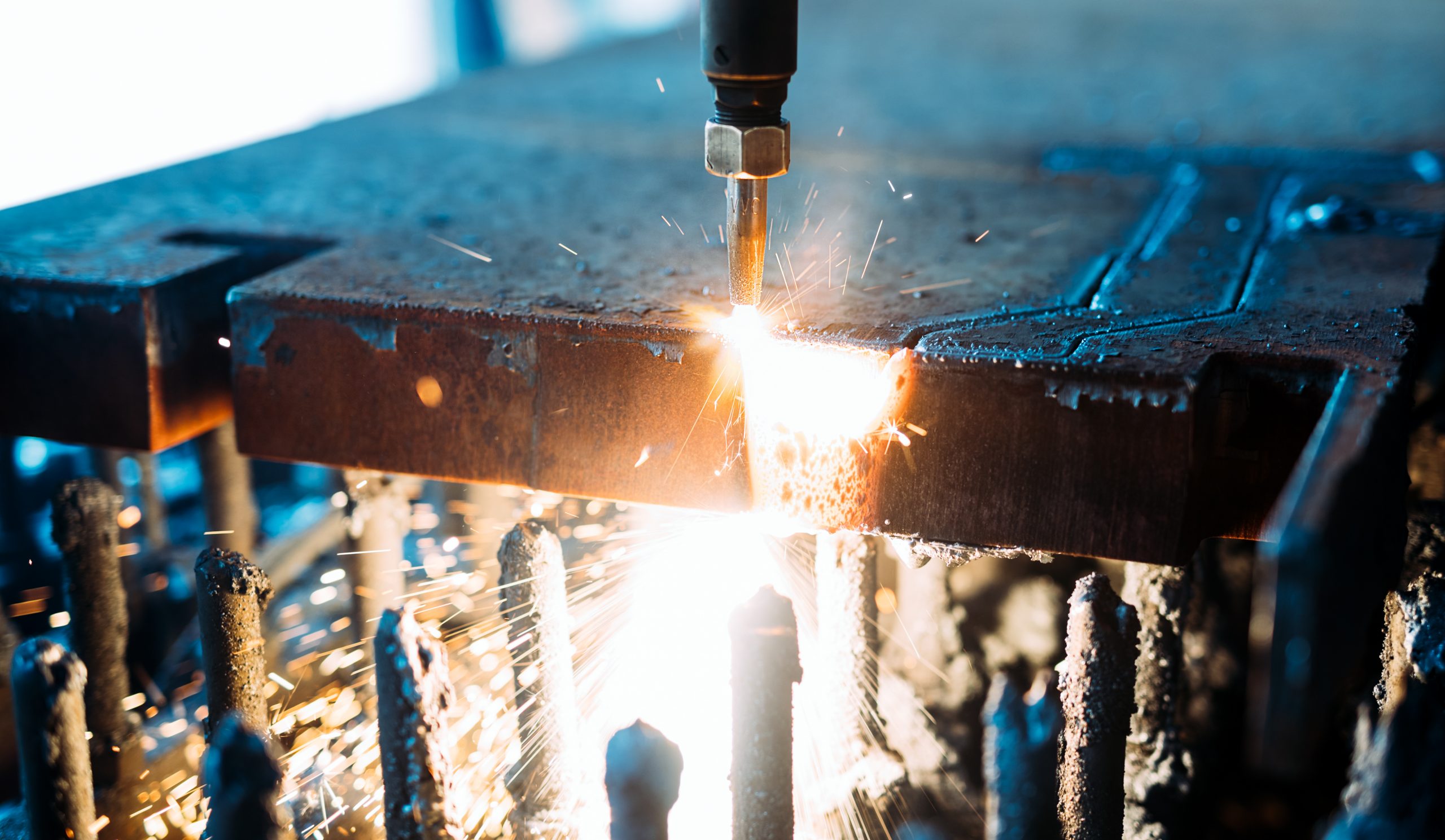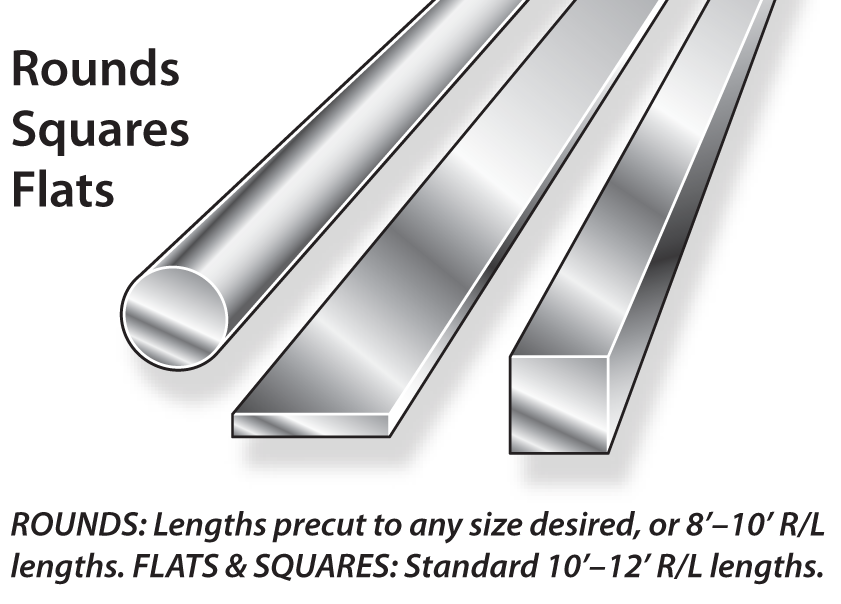BLUE

Ameralloy Air is an air-hardening tool steel possessing excellent non-deforming properties. Its wear resistance is midway between the high carbon/high chromium Ameralloy D-2“, and the manganese oil hardening steel, Ameralloy Oil.
While Ameralloy Air may be hardened by quenching in either air or oil, air-quenching is recommended to virtually eliminate the risk of breakage. Ameralloy Air is particularly adapted to applications that demand toughness and high abrasion resistance.
Typical Analysis
- Carbon 1.00
- Chromium 5.75
- Vanadium .25
- Molybdenum 1.15
- Silicon .20
- Manganese .60
Heat Treatment
- Forging 1700°–1950°F, stop at 1750°F, cool slowly
- Normalizing Do not normalize
- Annealing 1650°F, furnace-cool. Brinell 212 max.
- Preheating 1200°F prior to hardening
- Hardening 1775°F, air-quench to 150°F
- Tempering 350°– 400°F, resulting hardness Rockwell C 60–61
Features And Advantage
- Low distortion in heat treatment
- High abrasion resistance and hardness
- Good hardenability
Characteristics
Machinability If properly annealed to Brinell 212, Ameralloy Air has a machinability of 65, as compared with a 1% carbon tool steel rated at 100.
Dimensional stability When air-quenched from the proper hardening temperature, this grade generally expands .001 in./in. of cross section.
Critical points Critical point ranges obtained by dilatometer test when heating and cooling at a rate of 400°F/hour:
Heating – Ac range 1475° to 1540°F
Cooling – Ar range 1310° to 670°F
General Instructions
Forging Before forging Ameralloy Air, preheat at 1250°F and soak thoroughly. Then raise temperature to 2000°–2050°F, and hold until the steel is uniformly heated. Forging should be discontinued at 1700°F. Reheat as often as necessary to complete the forging operation. Immediately after forging, bury in an insulating medium to avoid cooling cracks.
Annealing Ameralloy Air should always be annealed after forging. To prevent decarburization, use a controlled atmosphere furnace or pack in a sealed container using inert material. To anneal for lowest hardness, heat slowly to 1650°F and hold at this temperature for approximately two hours per inch of greatest cross section. Cool at a rate of 20°F per hour to 1150°F and reheat to 1350°F. Hold three hours per inch of greatest cross section. Furnacecool at 20°F per hour to 1100°F, then furnace-cool to 900°F, then air-cool. Resulting hardness from this treatment will be Brinell 212 max.
Hardening To prevent decarburization, pack in inert material, or the treatment can be carried out in a salt bath or controlled atmosphere furnace. Preheat to 1200°F and hold at this temperature until thoroughly soaked. Heat to 1750°–1800°F, and hold for one hour per inch of greatest cross section. Remove from the furnace and cool in air. Although Ameralloy is primarily an air hardening grade, flash oil-quenching is occasionally used on large sections. However, tools must be removed from the oil when they reach 1000°F, then air-cooled to 150°F. Temper immediately to minimize the possibility of cracking.
Applications
- Cold forming
- Blanking
- Bending dies
- Forming rolls
- Broaches
- Knurling tools
- Gages
Ameralloy-tested fracture grain size and Rockwell C hardness of specimens 1” square x 4” long, quenched in air and oil after holding one hour at 1600°–1900°F:
| Still Air Quenching Temperature (°F) | Fracture Grain Size | Rockwell C |
|---|---|---|
| 1600° | 7 | 48 |
| 1650° | 9½ | 54 |
| 1700° | 9¾ | 59.5 |
| 1750° | 9¾ | 64 |
| 1800° | 10 | 64 |
| 1850° | ½ | 63 |
| 1900° | 9¼ | 62 |
| Oil Quenching Temperature (°F) | Fracture Grain Size | Rockwell C |
| 1600° | 9¾ | 54 |
| 1650° | 9¾ | 55 |
| 1700° | 9¾ | 62 |
| 1750° | 9¾ | 65 |
| 1800° | 9¾ | 64 |
| 1850° | 9.625 | 63.5 |
| 1900° | 9¾ | 62 |
Tempering After cooling in the quench to approximately 150°F, temper immediately. For most applications, Ameralloy Air should be tempered at 350 °–400°F at a minimum holding time of 2 hours per inch of greatest cross section. Rockwell C hardness of specimens
Rockwell C hardness of specimens 1” square when air-quenched from 1775°F or oil-quenched from 1750°F. Tempered at various temperatures:
| Rockwell C | ||
|---|---|---|
| Tempering Temperature (°F) | 1775°F Air-Quench | 1750°F Oil-Quench |
| None | 64 | 65 |
| 300°F | 62 | 62.5 |
| 400°F | 60 | 61 |
| 500°F | 56 | 57.5 |
| 600°F | 56 | 56 |
| 700°F | 56 | 56 |
| 800°F | 56 | 56 |
| 900°F | 56 | 56 |
| 1000°F | 56 | 55 |
| 1100°F | 50 | 50 |
| 1200°F | 43 | 45 |
| 1300°F | 34 | 34 |
Above results on 1” diameter specimens may be used as a guide in tempering tools to desired hardness. Tools of heavy section or mass may be several points lower in Rockwell hardness for a given treatment.
Effect Of Mass
Effectiveness of heat treatment on sections of increasing mass. Sample lengths of at least double the cross section were hardened as shown below. Rockwell C hardness obtained for 1” disc cut from the midsection of sample length:
| Hardness – (Re) | |||
|---|---|---|---|
| Size | Treatment | Surface | Center |
| 1 ” sq. | Preheat 1200°F, austenitize 1775°F, air-cool to 150°F Temper at 400°F | 64 61 |
64 61 |
| 4”sq. | Preheat 1200°F austenitize 1775°F Air-cool to 150° F Temper at 400°F | 63 59 |
60 59 |
| 5”sq. | Preheat 1200°F, austenitize 1775° F, oil to 1000° F Air-cool to 150°F Double temper at 400°F | 63 59 |
60 59 |
| 6”sq. | Preheat 1200°F, austenitize 1775°F, oil to 1000°F Air-cool to 150°F Double temper at 400°F | 62 59 |
59 57 |
| 8”sq. | Preheat 1200°F, austenitize 1775°F, oil to 150°F Double temper at 400°F | 62 61 |
61 59 |
Available Shapes And Size

Rounds Decarb Free Or Hot Rolled Annealed
| 1/4 | 1 | 2 | 4 | 7 |
| 5/16 | 1-1/16 | 2-1/8 | 4-1/4 | 7-1/2 |
| 3/8 | 1-1/8 | 2-1/4 | 4-1/2 | 8 |
| 7/16 | 1-1/4 | 2-3/8 | 4-3/4 | 8-1/2 |
| 1/2 | 1-3/8 | 2-1/2 | 5 | 9 |
| 9/16 | 1-1/2 | 2-5/8 | 5-1/4 | 10 |
| 5/8 | 1-5/8 | 2-3/4 | 5-1/2 | 11 |
| 11/16 | 1-3/4 | 2-7/8 | 5-3/4 | 12 |
| 3/4 | 1-7/8 | 3 | 6 | |
| 13/16 | 3-1/8 | 6-1/4 | ||
| 7/8 | 3-1/4 | 6-1/2 | ||
| 15/16 | 3-1/2 | |||
| 3-3/4 | ||||
| 1-1/8 | 1-1/4 | 1-3/8 | 1-1/2 | 1-3/4 |
| x 1-1/8 | x 1-1/4 | x 1-3/8 | x 1-1/2 | x 1-3/4 |
| x 1-1/4 | x 1-1/2 | x 1-3/4 | x 1-3/4 | x 3 |
| x 1-1/2 | x 1-3/4 | x 2 | x 2 | x 2-1/4 |
| x 1-3/4 | x 2 | x 2-1/4 | x 2-1/4 | x 2-1/2 |
| x 2 | x 2-1/4 | x 2-1/2 | x 2-1/2 | x 2-3/4 |
| x 2-1/4 | x 2-1/2 | x 3 | x 2-3/4 | x 3 |
| x 2-1/2 | x 2-3/4 | x 3-1/2 | x 3 | x 3-1/2 |
| x 2-3/4 | x 3 | x 4 | x 3-1/2 | x 4 |
| x 3 | x 3-1/2 | x 4-1/2 | x 4 | x 4-1/2 |
| x 3-1/2 | x 4 | x 5 | x 4-1/2 | x 5 |
| x 4 | x 4-1/2 | x 6 | x 5 | x 6 |
| x 4-1/2 | x 5 | x 8 | x 6 | x 7 |
| x 5 | x 6 | x 10 | x 7 | x 8 |
| x 6 | x 7 | x 12 | x 8 | x 10 |
| x 8 | x 8 | x 10 | x 12 | |
| x 10 | x 10 | x 12 | ||
| x 12 | x 12 | x 18-1/4 | ||
| x 18-1/4 | ||||
| 2 | 2-1/4 | 2-1/2 | 3 | 3-1/2 |
| x 2 | x 2-1/4 | x 2-1/2 | x 3 | x 3-1/2 |
| x 2-1/4 | x 2-1/2 | x 2-3/4 | x 3-1/2 | x 4 |
| x 2-1/2 | x 3 | x 3 | x 4 | x 4-1/2 |
| x 2-3/4 | x 3-1/2 | x 3-1/2 | x 4-1/2 | x 5 |
| x 3 | x 4 | x 4 | x 5 | x 6 |
| x 3-1/2 | x 4-1/2 | x 4-1/2 | x 6 | x 8 |
| x 4 | x 5 | x 5 | x 8 | x 10 |
| x 4-1/2 | x 6 | x 6 | x 10 | |
| x 5 | x 8 | |||
| x 5-1/2 | x 10 | |||
| x 6 | x 12 | |||
| x 8 | ||||
| x 10 | ||||
| x 12 | ||||
| 4 | 4-1/2 | 5 | 6 | |
| x 4 | x 4-1/2 | x 5 | x 6 | |
| x 4-1/2 | x 5 | x 6 | x 8 | |
| x 5 | x 6 | x 8 | x 10 | |
| x 6 | x 8 | x 10 | x 12 | |
| x 8 | x 10 | x 12 | ||
| x 10 | x 12 | |||
| x 12 | ||||
Not sure what you are looking for? Contact Ameralloy Steel an ISO 9001 certified supplier that specializes in finding hard-to-find Stainless and Alloys. Along with our proprietary grades Amera-Braze, Durelloy, and Dura-Krome. Our knowledgeable sales team will help you find what you are looking for. With many shapes, sizes, and material grades available, we can help you find what you are looking for. The most common items stocked are Tube, Pipe, Sheet, Plate, Hex bar, Square bar, Round bar, Threaded bar, Pump Shaft, and Millimeter sizes. We offer added fabrication services. Contact us now for the current price and delivery.
